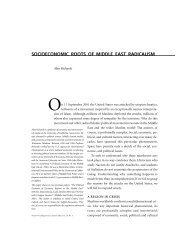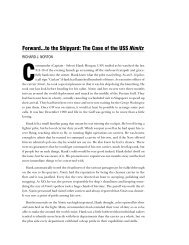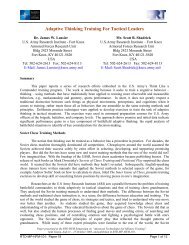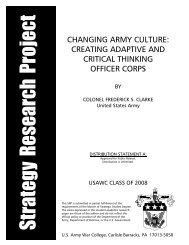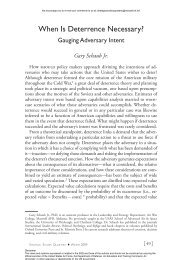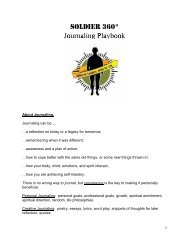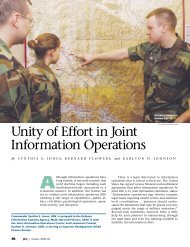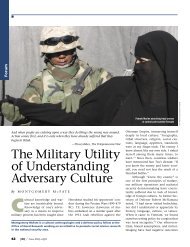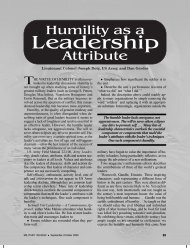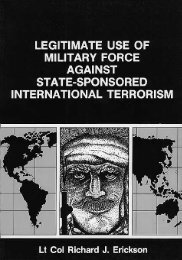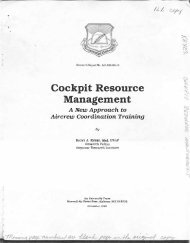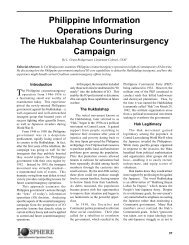Countering Child Suicide Bombers: Interview With Brooke Goldstein
Countering Child Suicide Bombers: Interview With Brooke Goldstein
Countering Child Suicide Bombers: Interview With Brooke Goldstein
You also want an ePaper? Increase the reach of your titles
YUMPU automatically turns print PDFs into web optimized ePapers that Google loves.
<strong>Countering</strong> <strong>Child</strong> <strong>Suicide</strong> <strong>Bombers</strong>:<br />
<strong>Interview</strong> <strong>With</strong> <strong>Brooke</strong> <strong>Goldstein</strong><br />
<strong>Interview</strong>ed By John Whisenhunt, Editor<br />
Editorial Abstract: Human rights attorney <strong>Brooke</strong> <strong>Goldstein</strong> produced the recent film “The Making of a Martyr,” a<br />
documentary addressing use of children as suicide bombers in the Palestinian Territories. <strong>Goldstein</strong> describes her field<br />
experiences and findings, examining the extensive social & cultural influences that enable child recruitment.<br />
IO Sphere: Social networking and<br />
family influence are perhaps the most<br />
powerful tools extremists possess. How<br />
are they corrupting young people into<br />
becoming bombers?<br />
BG: There are several factors that<br />
are influencing young, impressionable<br />
Palestinian children to become suicidehomicide<br />
bombers. Incitement to hate<br />
and to ‘martyr’ themselves is coming at<br />
these children from all directions. First<br />
of all you have state-run television,<br />
radio and print media that broadcast<br />
children’s programming with messages<br />
of hate and death. These programs<br />
are aimed at children as young as the<br />
pre-school age and come in the form<br />
of cartoons, music videos, talk shows,<br />
puppets, and adults dressed up as<br />
Mickey Mouse-like characters teaching<br />
children to violently kill themselves for<br />
the sake of Allah and jihad. The shows<br />
depict a fairy-tale paradise complete<br />
with amusement parks, candy and toys.<br />
Palestinian schools, as well as schools<br />
run by the UNRWA [United Nations<br />
Relief and Works Agency] hire teachers<br />
straight off the Hamas payroll, hang<br />
martyr posters on classroom walls and<br />
use textbooks that deny Israel’s right<br />
to exist, as well as objectify Jews and<br />
all infidels as subhuman creatures.<br />
Itamar Marcus has examples of this on<br />
his website, Palestinian Media Watch.<br />
Often, parents have gone on record<br />
stating they encourage their children to<br />
become suicide bombers and families of<br />
those ‘martyred’ receive cash payments<br />
from banks such as the Arab Bank, while<br />
they are revered, celebrated and honored<br />
by their community. The culture of<br />
martyrdom is inescapable when you live<br />
in the West Bank or Gaza. Adults and<br />
children who become suicide bombers<br />
are hailed as heroes and role models for<br />
children to emulate, schools and summer<br />
camps are named in their honor.<br />
On top of it all, terrorist groups<br />
such as the Al-Aqsa Martyrs Brigades,<br />
the Islamic Jihad and Hamas, who have<br />
each openly declared responsibility for<br />
recruiting children as suicide bombers,<br />
patrol the streets for their child victims.<br />
<strong>Child</strong>ren are being picked up, literally,<br />
from the classroom and sent out with<br />
(Fox News)<br />
explosives in under 48 hours! Some of<br />
the children that are preyed upon are those<br />
who have, for one reason or another, been<br />
marginalized. For example, Hussam<br />
Abdu, the main character of my film,<br />
was a fifteen year old, physically a dwarf,<br />
and therefore considered to be mentally<br />
handicapped child. He was convinced<br />
by the Al Aqsa Martyrs Brigades that he<br />
would become popular and famous if<br />
he blew himself up. Al-Aqsa used two<br />
of Hussam’s fifth grade classmates—<br />
each paid 100 dollars—to recruit him.<br />
Fortunately, Hussam was smart enough<br />
to turn himself in. Unfortunately, he has<br />
been tried and convicted of attempted<br />
murder and is now serving out an eight<br />
year sentence in an Israeli prison.<br />
I want to make clear, that the child<br />
suicide bomber is as much a victim of<br />
a crime as are the innocent civilians<br />
killed in his or her explosive wake.<br />
This child does not have the malicious<br />
intent required to convict him of murder.<br />
These children are victims of the most<br />
egregious human right violation, the<br />
premeditated murder of ones own<br />
children. The incitement and recruitment<br />
of Palestinian children to become suicide<br />
bombers is grossly illegal, it is state<br />
sponsored mass infanticide and frankly,<br />
the practice is a form of societal suicide<br />
completely unprecedented in recorded<br />
human history.<br />
Palestinian children are not doing<br />
this of their own free will, nor are they<br />
doing this for political reasons. It was<br />
not out of desperation, but aspiration to<br />
become heroes, to become famous, to<br />
have sex with virgins, to go to paradise.<br />
For us suicide bombing is still abhorrent;<br />
for these children it’s like eating french<br />
fries. They literally don’t understand that<br />
you die when you blow your limbs apart,<br />
there is a mental disconnect there; death<br />
is not martyrdom. It’s like becoming a<br />
rock star overnight.<br />
Also, this phenomenon is spreading<br />
beyond the West Bank and Gaza. We are<br />
now seeing child suicide bombing in areas<br />
such as Iraq and Afghanistan. <strong>Child</strong>ren<br />
are being educated in Pakistani mosques,<br />
are kidnapped, sexually and physically<br />
abused and then driven across the border<br />
by Talibani terrorists for missions in<br />
Iraq against not only American soldiers,<br />
but also Iraqi citizens, including other<br />
children. Afghan President Hamid<br />
Karzai is pardoning six year old children<br />
recruited by the Taliban for suicide<br />
missions and who are told their belt will<br />
spray flowers! Some of these children<br />
are also voluntarily turning themselves<br />
12 Fall 2007
into the authorities. Al Manar network,<br />
the Hizballah-run television station, is<br />
being broadcast via satellite throughout<br />
Europe and has been named as one of the<br />
most influential factors in radicalizing<br />
European Muslim youth. How much<br />
longer will it be until we see a child<br />
suicide bomber in London?<br />
IO Sphere: Say you were building a<br />
case as an attorney: who is most culpable<br />
for these actions; who do we go after?<br />
BG: Let’s look at that both legally<br />
and morally. Who are we going blame?<br />
My position is these children are<br />
innocent. They don’t deserve blame,<br />
or jail, or to pay for the crimes of<br />
adults who abuse them as political<br />
pawns. According to international law,<br />
customary law, and morality, children<br />
under the age of eighteen are juveniles.<br />
They’re innocents, and they don’t have<br />
the maturity or capacity comprehend<br />
the gravity of these situations, to weigh<br />
the value of their own life against the<br />
political impact of a suicide attack—so<br />
the last thing we want to do is blame<br />
the children for this phenomenon. The<br />
children are the victims, this is clear.<br />
Obviously those culpable are the adults<br />
who recruit and physically put bombs<br />
around children’s waists, drive them<br />
to checkpoints, and either instruct the<br />
children to blow themselves up or<br />
detonate them by remote control. So<br />
there’s culpability with these terrorists,<br />
but the chances of going to the West<br />
Bank or Gaza and handcuffing them,<br />
then hauling them to some international<br />
court are slim.<br />
What about the parents? Why aren’t<br />
the parents teaching their children to<br />
be safe, to love life, to seek a future?<br />
Even if they do, that message is directly<br />
contradicted by everything the children<br />
see on TV, everything they learn at<br />
school, from the Internet, even by the<br />
sticker albums they’re given! When I<br />
was in the West Bank in 2004, the fad<br />
was sticker albums, where you have<br />
heads of martyrs and you place them<br />
in different settings, like on a cloud in<br />
heaven… collect all twenty of the most<br />
recent suicide bombers! Who in their<br />
right mind is printing those? They too are<br />
responsible. The chief programmer at PA<br />
TV, whom I interviewed in my film, is<br />
directly responsible for incitement to mass<br />
murder Palestinian children by airing<br />
inciteful cartoons and programming.<br />
The Palestinian Authority, Hamas, other<br />
state governments like Iran, state banks<br />
in Arab countries that financially support<br />
the families of suicide bombers, all play a<br />
role. And charities who donate to Hamas,<br />
knowing they recruit children are also<br />
responsible… they need to put conditions<br />
on their money, or just donate decent<br />
textbooks. So what we have is a complex<br />
problem where martyrdom is ingrained<br />
in the culture of the Palestinians and is<br />
supported ideologically and financially<br />
by various outside sources.<br />
The first step, at least, must be for<br />
the UN, international organizations and<br />
human rights organizations to outright<br />
condemn this practice. To date, the<br />
UN has issued hundreds of resolutions<br />
condemning Israel for alleged human<br />
rights violations, yet it has issued not<br />
one denouncing child suicide bombing<br />
as a crime against humanity. Those who<br />
claim to be the protectors of Palestinian<br />
children, those who toil to expose the<br />
alleged human rights violations against<br />
them by Israel, surely they must be<br />
outraged by the intentional murder of<br />
these children by their own community!<br />
Can you imagine what would happen<br />
if any western state strapped bombs<br />
on horses or dogs and sent out those<br />
animals to detonate amongst civilian<br />
populations? There would be deafening<br />
outcry amongst animal rights groups, and<br />
rightly so! But when it comes to the use<br />
of Muslim children in this manner, no<br />
one is screaming out! Why?<br />
Second, the western media needs<br />
to start reporting accurately on events<br />
in the Middle East. Rarely does the<br />
media mention the age and origin of<br />
a Palestinian, Iraqi or Afghani suicide<br />
bomber, and this is leading many to<br />
dangerous misconceptions about why we<br />
have suicide bombing in the first place.<br />
For, a six-year-old child kidnapped and<br />
forced to become a suicide bomber is<br />
not doing it for the same reasons as a<br />
26-year-old local does. Public awareness<br />
must be raised and fruitful debate must<br />
begin about this crime against children<br />
because ignoring it is sending the<br />
message that we don’t care or that we<br />
condone the activity, and the longer<br />
we are silent, the longer this practice<br />
will continue. Special prosecutors at<br />
the UN and at the Hague should take<br />
these cases on and attorneys should be<br />
motivated to lobby for the application of<br />
international human rights law in other<br />
international and national courts of law.<br />
But ultimately, change must come from<br />
within the Muslim community itself.<br />
Moderate Muslim parents must speak out<br />
against the indoctrination and recruitment<br />
of their own children. Terrorists are very<br />
aware of the hearts and minds battle, and<br />
if they see that they are losing support<br />
within the Muslim community, maybe<br />
they will cease this practice.<br />
IO Sphere: Let’s talk about making<br />
the film. Here you are, a young, educated<br />
western woman, and in the eyes of these<br />
folks you’re the wrong faith… the deck<br />
is stacked against you walking into that<br />
environment. But if you can talk to these<br />
people, is there hope for other dialog<br />
with extremists?<br />
BG: The people I interviewed had<br />
no qualms, and were very happy to talk<br />
about their practices, because from their<br />
point of view, they are doing God’s work.<br />
The fact that they were willing to talk<br />
to me, however, doesn’t mean that they<br />
are reasonable or humanitarian people.<br />
After all, we were talking openly about<br />
how they recruit and kill children in<br />
suicide attacks. As for me, a woman<br />
without any real protection, and kind<br />
of naïve…yes that was very frivolous<br />
of me. But I did not want to make a<br />
film that was full of hearsay, I wanted<br />
to get confessions from the perpetrators<br />
mouths themselves and they indeed<br />
hung themselves without the need for<br />
a didactic narrative condemnation. No<br />
one asked about my background or about<br />
my beliefs, they were just interested<br />
that <strong>Brooke</strong> from Canada had a TV<br />
camera. And they opened up. The<br />
Palestinian territories are very used to<br />
journalists; Gaza and the West Bank<br />
have got to be two of the most covered<br />
areas in the entire world. I don’t know<br />
how it compares to Iraq right now, but<br />
13
journalists are all over. So all we did<br />
was take some tape and mark “TV” on<br />
the side of our Jeep, and drive through<br />
the camps. Everyone would come up<br />
and say “ah, television… where are you<br />
from?” We’d reply “Canada,” and that<br />
was all it took. What can I say, they liked<br />
to be on TV.<br />
IO Sphere: If you hadn’t been able<br />
to offer that, do you feel they would they<br />
have been as receptive?<br />
BG: I think so. People are happy<br />
to talk with an individual. They were<br />
happy to sit with me just like I’m happy<br />
to talk with you. Maybe there’s a bit<br />
of selfishness, and they wanted a little<br />
fame. Zakaria Zubeidi of the al-Aqsa<br />
Martyrs’ Brigades—the most wanted<br />
man in the West Bank—survivor of five<br />
assassination attempts, regularly talks<br />
to the media. That’s the whole strategy<br />
with these guys. Again, here’s the fame<br />
element of wanting to become a ‘star’<br />
militant, and wanting to be recognized.<br />
They know they’re not here on the<br />
planet for long—a lot of the people<br />
we interviewed are now dead. There’s<br />
a scene where I’m interviewing five<br />
masked gunmen and three of them are<br />
no longer around. Catch your fifteen<br />
minutes while you can. They had a<br />
moment to say “Look at us, we’re<br />
ruthless… we’re making a statement<br />
here.” That statement being “we recruit<br />
children as young as ten years old,” for<br />
suicide attacks.<br />
IO Sphere: North America is full of<br />
talented folks who can create messages<br />
like your film. How do we get media<br />
and government together as creative<br />
talent?<br />
BG: I think our government needs to<br />
support our independent journalists and<br />
filmmakers—whether through monetary<br />
or logistical support, or a research base<br />
—because it’s very important for the<br />
American government to get the truth<br />
out there. This is as much a propaganda<br />
war as it is a physical battle, and frankly,<br />
we can’t afford to lose the propaganda<br />
war. The media as we know it does a very<br />
poor job of reporting, especially when<br />
it comes to the root causes of suicide<br />
bombing, which is largely a product of<br />
hate education. As I referenced in my<br />
talk earlier, since 2000 one of every five<br />
suicide bombers in the Palestinian-Israeli<br />
conflict has been aged eighteen and<br />
under. That’s a number you’re probably<br />
not going to find unless you do a whole<br />
slew of research, or talk to me… and<br />
why is our media not reporting the facts<br />
properly? Because a fifteen year old<br />
handicapped suicide bomber recruited<br />
against his own will does not fall into<br />
their version of the adult Palestinian<br />
suicide bomber frustrated with the<br />
‘occupation,’ and driven to suicide<br />
because of desperation. So, I think the<br />
government should support independent<br />
filmmakers and truth tellers risking their<br />
lives in war zones.<br />
IO Sphere: In building messages<br />
we’re trying to find people who can<br />
work both the softer artistic side, and<br />
the harder tech side. What advice would<br />
you give someone who wanted to be like<br />
you—an advocate and a filmmaker?<br />
BG: Obviously as a filmmaker<br />
you’re going in with a goal, and you<br />
have to choose a good subject. And<br />
you have to take maybe eighty hours<br />
of footage and edit it down to sixty<br />
minutes of compelling human-interest<br />
stories. Most importantly, you can’t<br />
approach your topic didactically; you<br />
have to trust your audience. They’re<br />
smart, give them the truth. They will,<br />
they should, and they must come to the<br />
right conclusion. What we tried to show<br />
in “The Making of a Martyr,” was the<br />
experience of Palestinian children and<br />
the attitudes of their community straight<br />
from the mouths of the perpetrators and<br />
the victims themselves. Through their<br />
stories, without a bunch of ‘talking<br />
heads,’ our audience must come to their<br />
own conclusions: do they or do they<br />
not support this activity? Regardless of<br />
where they stand politically, regardless<br />
of whether they are right or left, pro-<br />
Palestinian or pro-Israeli, do they<br />
advocate the murder of Palestinian<br />
children in this manner? <strong>Child</strong> suicide<br />
bombing is a subject with a clear truth,<br />
one that does not need to be ‘spun’ or<br />
‘packaged.’ <strong>Child</strong>ren are innocent, they<br />
don’t deserve to die, they don’t deserve<br />
to be taught to kill themselves, and they<br />
don’t deserve to be killed by remote<br />
control suicide belt detonation! If you<br />
present this accurately, I think everyone<br />
will agree. But if you’re going to be a<br />
filmmaker, that doesn’t always mean<br />
objectivity—I think that’s overrated. As<br />
filmmaker and as a journalist you should,<br />
and sometimes you must, take a position.<br />
And it should be a result of the research<br />
you accumulate. Your audience should<br />
come to the same conclusion when you<br />
show them the results of your entire<br />
research—the accurate information you<br />
collected, and the unedited words of<br />
your interview subjects. I didn’t have<br />
to spin this story: my interviewees told<br />
me ‘straight up’ they recruit kids. I<br />
let them speak for themselves, and let<br />
the audience condemn them on their<br />
own accord. Show people something<br />
they don’t have the opportunity to see<br />
firsthand. Documentary filmmakers<br />
should not feel the need to be objective to<br />
the point where if a message starts coming<br />
through in the film, they have to actively<br />
seek out someone who contradicts that<br />
message. We did about eighty-one hours<br />
of interviews, and an overwhelming<br />
message emerged. I didn’t go out to find<br />
an armchair philosopher to contradict the<br />
evidence that is clear and out in the open.<br />
There’s a disease of political correctness<br />
that says you’re biased if you take a side,<br />
and that’s simply untrue.<br />
There is a part in the film where we<br />
show people who are clearly denying<br />
facts. And when your interview subject is<br />
lying, and you know that, then you have<br />
a responsibility to your audience to show<br />
that he is lying. And ideally you will do<br />
this not through insulting narrative, but<br />
by presenting evidence of their betrayal<br />
to your audience. We interviewed Yayha<br />
Barakat, chief programmer at PA TV,<br />
and asked him “do your programs incite<br />
violence?” He said, “absolutely not,<br />
we don’t incite violence.” Dispersed<br />
throughout his interview we inserted<br />
clips from PA TV, and without saying<br />
anything we just showed the clips. Our<br />
audience can see for themselves he is<br />
lying—no one had to tell them, because it<br />
14 Fall 2007
was evident from the clips themselves.<br />
IO Sphere: Let’s shift gears a bit.<br />
As an attorney and an advocate, and<br />
given current international law, how<br />
do we fight this problem from a legal<br />
standpoint?<br />
BG: There’s a problem. We<br />
have international law that is clearly<br />
codified, widely ratified treaties, and<br />
conventions on the rights of children, the<br />
United Nations Charter: the laws exist.<br />
The problem is that they’re not being<br />
enforced. Why? Issues of jurisdiction,<br />
problems of state sovereignty, problems<br />
of biased courts, problems of special<br />
prosecutors who don’t want to take this<br />
up. Then there’s non-recognition of<br />
international law: people simply think<br />
these laws don’t apply to them. Finally,<br />
there’s no motivation on the part of<br />
attorneys to spend their time; take the<br />
pro bono hours, travel to the war zones,<br />
collect the depositions… when you could<br />
be working for a top firm in New York<br />
instead. I mean, here I am with a degree<br />
in human rights law, and sometimes it<br />
seems useless! So to collect data on<br />
human rights violations, I had to make<br />
a documentary film. The only hope I<br />
see for enforcement of international law<br />
is raising public awareness, sparking<br />
public debate, and people becoming<br />
appalled enough to get their elected<br />
representatives to take up the issues<br />
with places like the UN. Countries like<br />
the US, Canada, France, Germany—all<br />
democratic countries that are party to<br />
the UN—need to pressure the special<br />
prosecutors of the international courts,<br />
set up special courts, and expand the<br />
jurisdiction of their national courts<br />
to allow for the civil and criminal<br />
prosecution of these crimes. Someone<br />
needs to start pressuring The Hague to<br />
add these cases to their dockets.<br />
Moreover, we need to start using<br />
the right legal language. Al-Aqsa is<br />
not militant, they are criminal terrorists.<br />
They are child abusers. They are<br />
child murderers and the Palestinian<br />
Authority is complicit in these crimes.<br />
What’s happening in the West Bank to<br />
Palestinian children at the hands of their<br />
own society isn’t lawful resistance: it is<br />
illegal. Yet we can’t even come up with<br />
a clear [legal] definition of terrorism;<br />
that’s ridiculous! We need to define it<br />
within ourselves ‘what is terrorism?’<br />
Certainly the base line definition is the<br />
intentional murder of innocent (civilian)<br />
children at the hands of their own state<br />
and state-sponsored institutions and<br />
militant groups for intimidation and<br />
political purposes. This is exactly what is<br />
going on, and if the world can’t come to<br />
a consensus, Muslims and non-Muslims,<br />
left and right alike, that it is wrong to kill<br />
a child, then our civilization has come to<br />
a very low point.<br />
IO Sphere: You’ve had some<br />
significant experiences in researching<br />
and making the film. Is there any one<br />
thing that really stands out?<br />
BG: A couple of things stand out.<br />
One is the role that drugs play: children<br />
are given hashish prior to going out<br />
on these suicide attacks. That’s how<br />
they numb the children, and get them<br />
‘woozy’ and willing to commit suicide.<br />
The Al-Aqsa Martyrs’ Brigades actually<br />
gave us blocks of hash as a gift for<br />
interviewing them, as if it were some<br />
sort of honor. What Palestinian children<br />
need is rehabilitation, a re-education<br />
because of what they have and are still<br />
going through. We also need to support<br />
Palestinian parents who are willing to<br />
speak out against this practice because<br />
the standard so far is violent intimidation<br />
against anyone who speaks out against<br />
the Intifada. Zacharia Zubeidi told me<br />
that if any parent opposed him, he would<br />
publicly accuse them of collaborating<br />
with the Israelis and deal with them<br />
accordingly. Now I just find it hard to<br />
believe that the majority of Palestinian<br />
parents willingly advocate the death<br />
of their own children. The Palestinian<br />
society is being held hostage by a<br />
lunatic fringe that is becoming larger and<br />
stronger every day to the extent that it is<br />
becoming the new mainstream.<br />
IO Sphere: And you spent time with<br />
that fringe. That takes some guts.<br />
BG: Oh, I was young and naïve! You<br />
can’t condemn or praise a society until<br />
you’ve met them, and researched their<br />
ways. I wouldn’t have any credibility to<br />
take up this issue unless I knew what I<br />
was talking about, firsthand. Why should<br />
anyone listen to me? It turned out to be<br />
much worse than I expected. And to the<br />
point of this seminar, this is something<br />
we can come to consensus on—with<br />
our enemies even—it doesn’t matter<br />
where you stand in the socio-political<br />
spectrum!<br />
IO Sphere: That’s quite a message.<br />
Thank you for sharing these incredible<br />
and disturbing experiences.<br />
BG: This has been a very worthwhile<br />
experience and I’m very glad to have<br />
been a part of it. Thank you.<br />
15



